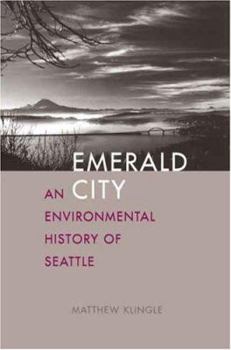Emerald City: An Environmental History of Seattle
(Part of the The Lamar Series in Western History Series)
Select Format
Select Condition 
Book Overview
An exploration of the environmental history of Seattle and what it tells us about making cities that are both scenic and just for all At the foot of the snow-capped Cascade Mountains on the forested... This description may be from another edition of this product.
Format:Hardcover
Language:English
ISBN:0300116411
ISBN13:9780300116410
Release Date:November 2007
Publisher:Yale University Press
Length:344 Pages
Weight:1.45 lbs.
Dimensions:1.2" x 6.3" x 9.5"
Customer Reviews
3 ratings
Excellent Examination of the Interplay of History & The Environment
Published by Thriftbooks.com User , 15 years ago
If you are interested in both history and the environment, and a new, rigorous and thoughtful way of examining the interplay between the two, then The Emerald City will undoubtedly interest you. Mr. Klingle tackles the history of Seattle - literally from the ground (or is that the Sound?) up - with an eye on showing how the building of a major metropolitan city can lead to both inevitable and surprising consequences, even when said city-building is done with a cognizance of the need to take into account surrounding pristine environs, and, indeed, even when trying to develop the city with the best interests of the environment in mind. Which, I think, is the point; one cannot separate development and the environment, and as such they must be approached with a new paradigm. Klingle comes at this tale from multiple angles - the greed and power of the early railway companies, the socio-economic impact not only on the native Sound tribes but on the early western settlers as well, the planning of Seattle's verdant parks by Olmstead, an extremely eye-opening take of the interplay between ecology and urban poverty - and brings them together in a way that, in the end, to my mind echoed perfectly the multiple waterways that all feed into, and sustain, Seattle. That Mr. Klingle is a top-notch writer, with the ability to turn a beautiful phrase or metaphor with seeming ease, is just icing on the cake. I am neither an academic nor a scholar, but The Emerald City is a book of surpassing intelligence and thoughtfulness, and, like the "emerald" associated with Seattle, a gem worth looking into. Highly recommended.
A History that Speaks to All Cities
Published by Thriftbooks.com User , 16 years ago
Matthew Klingle has written a brilliant study of how the city--in this case Seattle but it could be any city--creates both beauty and ugliness in the same instance. Tracing stories about the physical, social, and cultural reorganization of Seattle and its hinterlands, Klingle shows exactly why the effort to build a more livable city also made Seattle increasingly unlivable for some of it residents. Readers will be left with a deeper appreciation for both the strength and weakness of urban environmental reform over the last century, how issues related to urban ecology have been intrinsically related social inequity, and why historical perspective of these dynamics is absolutely crucial when cities tackle environmental problems. The epilogue is simply brilliant, providing readers with a brave and smart discussion of why acknowledging the shortcomings of past policies is essential for developing what Klingle calls a historically-informed "ethic of place" as residents move forward into the future. This is an exceptional work of history.
A History that Speaks to All Cities
Published by Thriftbooks.com User , 16 years ago
Matthew Klingle has written a brilliant study of how the city--in this case Seattle but it could be any city--creates at once both beauty and ugliness. Tracing stories about the physical, social, and cultural reorganization of Seattle and its hinterlands, Klingle shows exactly why the effort to build a more livable city also made Seattle increasingly unlivable for some residents. Readers will be left with a deeper appreciation for the strengths and weaknesses of urban environmental reform in the last century, how urban ecology intrinsically shaped social inequity, and why historical perspective is absolutely crucial when cities decide to address environmental problems. The epilogue is simply brilliant, providing readers with a brave and smart discussion about why acknowledging the shortcomings of past policies is essential for developing what Klingle calls a historically-informed "ethic of place" as residents turn to the future. This is an exceptional work of history.





